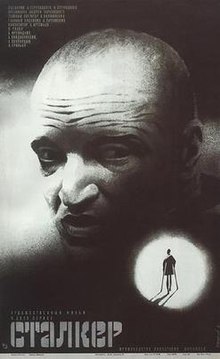| Stalker | |
|---|---|
 Original release poster | |
| Directed by | Andrei Tarkovsky |
| Screenplay by | |
| Based on | |
| Produced by | Aleksandra Demidova[n 1] |
| Starring | |
| Cinematography | Alexander Knyazhinsky |
| Edited by | Lyudmila Feiginova |
| Music by | Eduard Artemyev |
Production company | |
| Distributed by | Goskino |
Release date |
|
Running time | 161 minutes[3] |
| Country | Soviet Union |
| Language | Russian |
| Budget | 1 million Rbls[2] |
| Box office | 4.3 million tickets[4] |
Stalker (Russian: Сталкер, IPA: [ˈstaɫkʲɪr]) is a 1979 Soviet science fiction film directed by Andrei Tarkovsky with a screenplay written by Arkady and Boris Strugatsky, loosely based on their 1972 novel Roadside Picnic. The film tells the story of an expedition led by a figure known as the "Stalker" (Alexander Kaidanovsky), who guides his two clients—a melancholic writer (Anatoly Solonitsyn) and a professor (Nikolai Grinko)—through a hazardous wasteland to a mysterious restricted site known simply as the "Zone", where there supposedly exists a room which grants a person's innermost desires. The film combines elements of science fiction and fantasy with dramatic philosophical, and psychological themes.[5]
The film was initially filmed over a year on film stock that was later discovered to be unusable, and had to be almost entirely reshot with new cinematographer Alexander Knyazhinsky. Stalker was released by Goskino in May 1979. Upon release, the film garnered mixed reviews, but in subsequent years it has been recognized as one of the greatest films of all time, with the British Film Institute ranking it #29 on its 2012 list of the "100 Greatest Films of All Time".[6] The film sold over 4 million tickets, mostly in the Soviet Union, against a budget of 1 million roubles.[2][4]
- ^ Johnson, Vida T.; Graham Petrie (1994), The Films of Andrei Tarkovsky: A Visual Fugue, Indiana University Press, pp. 57–58, ISBN 0-253-20887-4
- ^ a b c Johnson, Vida T.; Graham Petrie (1994), The Films of Andrei Tarkovsky: A Visual Fugue, Indiana University Press, pp. 139–140, ISBN 0-253-20887-4
- ^ "STALKER (PG)". British Board of Film Classification. 2 December 1980. Retrieved 7 November 2022.
- ^ a b Cite error: The named reference
bowas invoked but never defined (see the help page). - ^ Nick Schager (25 April 2006). "Stalker". Slant Magazine. Retrieved 13 March 2016.
- ^ Cite error: The named reference
BFI Top 50 2012was invoked but never defined (see the help page).
Cite error: There are <ref group=n> tags on this page, but the references will not show without a {{reflist|group=n}} template (see the help page).